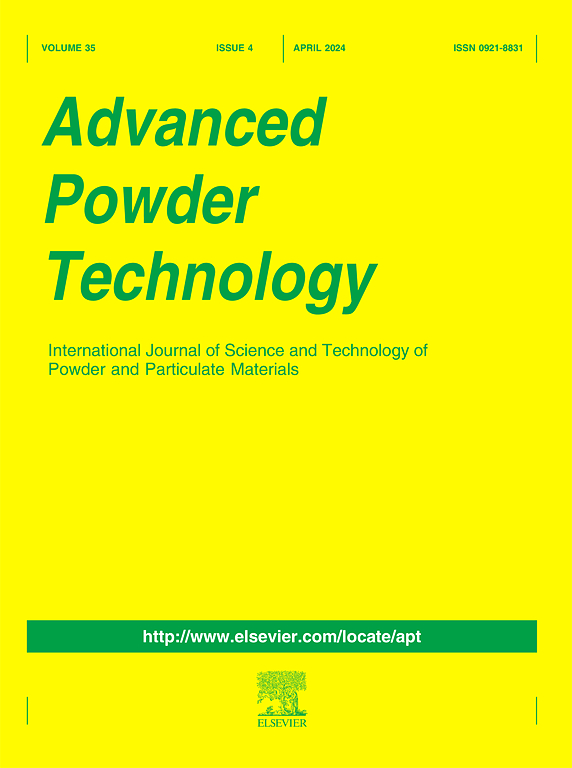利用雾化增强的异相蒸汽冷凝技术提高旋风分离器去除细颗粒的能力
IF 4.2
2区 工程技术
Q2 ENGINEERING, CHEMICAL
引用次数: 0
摘要
使用热交换器冷却高湿度烟气可以创造一个过饱和的水蒸气环境,使细小颗粒通过异相水蒸气冷凝长成大液滴,有利于传统设备去除细小颗粒。但由于冷却获得的可冷凝水汽有限,该技术只能用于颗粒浓度较低的烟气中。本研究在热交换器前加入雾化液滴,以改善高颗粒浓度下的异相蒸汽冷凝效果,然后与旋风分离器耦合,用于湿法除尘系统后的烟气深度处理。通过实验室实验和某冶金公司的旁路实验,研究了颗粒物的去除特性。实验结果表明,与单一异相冷凝相比,雾化-异相冷凝的应用使旋风分离器后的颗粒浓度降低了 74.2%。温降和雾化体积分别影响了尺寸为 < 2 μm 和 > 2 μm 的颗粒的去除。工业烟气旁路实验表明,该系统对波动条件有很强的适应性。当入口颗粒浓度不超过 2000 mg/Nm3 时,出口颗粒浓度可保持在 20 mg/Nm3 以内。本文章由计算机程序翻译,如有差异,请以英文原文为准。

Improving the removal of fine particles in cyclone using heterogeneous vapor condensation enhanced by atomization
Using a heat exchanger to cool high humidity flue gas can create a supersaturated water vapor environment, allowing fine particles to grow into large droplets by heterogeneous vapor condensation, which is conductive to the removal of fine particles by traditional equipment. However, due to the limited condensable vapor obtained by cooling, this technology can only be used in the flue gas with low particle concentration. In this study, atomization droplets were added before the heat exchanger to improve the effect of heterogeneous vapor condensation at high particle concentration, and then coupled with a cyclone separator, which was used for the deep treatment of the flue gas after the wet dedusting system. The particle removal characteristics were investigated through laboratory experiments and bypass experiments in a metallurgical company. The experimental results show that the application of atomization-heterogeneous condensation reduced the particles concentration after cyclone by 74.2 % compared with that of single heterogeneous condensation. Temperature-drop and atomized volume affected the removal of particles with size < 2 μm and > 2 μm, respectively. The industrial flue gas bypass experiment indicated that the system had strong adaptability to fluctuating conditions. When the inlet particle concentration did not exceed 2000 mg/Nm3, the outlet particle concentration can be maintained within 20 mg/Nm3.
求助全文
通过发布文献求助,成功后即可免费获取论文全文。
去求助
来源期刊

Advanced Powder Technology
工程技术-工程:化工
CiteScore
9.50
自引率
7.70%
发文量
424
审稿时长
55 days
期刊介绍:
The aim of Advanced Powder Technology is to meet the demand for an international journal that integrates all aspects of science and technology research on powder and particulate materials. The journal fulfills this purpose by publishing original research papers, rapid communications, reviews, and translated articles by prominent researchers worldwide.
The editorial work of Advanced Powder Technology, which was founded as the International Journal of the Society of Powder Technology, Japan, is now shared by distinguished board members, who operate in a unique framework designed to respond to the increasing global demand for articles on not only powder and particles, but also on various materials produced from them.
Advanced Powder Technology covers various areas, but a discussion of powder and particles is required in articles. Topics include: Production of powder and particulate materials in gases and liquids(nanoparticles, fine ceramics, pharmaceuticals, novel functional materials, etc.); Aerosol and colloidal processing; Powder and particle characterization; Dynamics and phenomena; Calculation and simulation (CFD, DEM, Monte Carlo method, population balance, etc.); Measurement and control of powder processes; Particle modification; Comminution; Powder handling and operations (storage, transport, granulation, separation, fluidization, etc.)
 求助内容:
求助内容: 应助结果提醒方式:
应助结果提醒方式:


